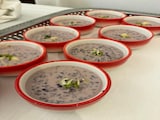The scale of prediabetes (a health condition where the blood sugar levels are more than usual but not high enough to be diagnosed as type 2 diabetes) in India stands at nearly 25 million cases. According to the WHO (World Health Organization), most of the population that is prediabetic don't know their status, which leads to further health complications. There is a growing need for simple, diet-based solutions that can control the growing trend of people developing prediabetes. A new study has landmark findings in this regard, and they've come to it by correlating the consumption of strawberries daily to significant improvement in key health markers in prediabetic adults.
In the recent study published in the Antioxidants journal, researchers have dissected the impacts of consuming freeze-dried strawberries on the antioxidant status, fasting blood glucose, and vascular inflammation in the human body.
In the study, the main finding is that eating freeze-dried strawberries daily for 12 weeks can reduce inflammation markers and fasting glucose. Alongside, multiple antioxidant biomarkers significantly increase, highlighting strawberries as a practical dietary choice that improves fasting glucose and boosts antioxidant fighters.
The ideal serving of strawberry consumption is only 2.5 servings per day, or one large cup of fresh strawberries. While fresh strawberries are better than frozen strawberries, there is no distinction in their nutritional value. But it depends on their freezing method and storage conditions. A study published in the Journal of Food Science found that frozen strawberries retained up to 90% of their vitamin C content, compared to fresh strawberries, which lost up to 50% of their vitamin C content after just one week of storage.
This makes for a compelling evidence that consumption of strawberries year-round is crucial for prediabetic adults, as well as people in general, for better immunity against health conditions.
What Are The Key Results Of The Study?
The most impactful findings from this study are as follows:
- Significant drop in fasting glucose (blood sugar)
- Improved Insulin sensitivity (cells respond better to insulin)
- Reduced body weight or body mass index (value derived from mass and height of a person, which is typically used to assess a healthy body weight, but it has its limitations and biases that affect its outcome)
- Lower levels of inflammation (e.g., C-reactive protein: produced by the liver that increases the response to inflammation )
Note: Body Mass Index or BMI is not a true measure to assess a healthy body weight and is subject to limitations arising from its origins and applicability to a wide variety of genders and body physiology.
The Secret Of Strawberries And Their Powerhouse Compounds
The strawberry is known as a bioactive hero with compounds that contain pigments and help with the absorption of nutrients. Namely, polyphenols/anthocyanins (the compounds that give strawberries their rich pigments), these potent antioxidants reduce oxidative stress and inflammation. While the root causes of insulin resistance are reduced by increasing antioxidant consumption. It's important to understand how it works.
Both ellagitannins (bioactive compounds in plant sources) and fibre help with slow sugar absorption and contribute to improved gut health and blood sugar stability. Strawberries have a low glycemic index (a scale of ranking carbohydrates and how much they raise the blood sugar) and low-carb, which means that they don't cause blood sugar spikes.
Consumption of strawberries can be easily implemented as part of your daily routine by using simple methods. These can include making it a part of breakfast with yogurt or consuming it as is or frozen, depending on seasonal availability and proper storage solutions.
Note: Only consuming strawberries is not the absolute solution to prescribed medical conditions. Please include strawberries in your diet as part of a healthy and balanced diet to reap its benefits and avoid developing health conditions that can be mitigated through the consumption of a healthy diet and lifestyle.
Disclaimer: This content, including advice, provides generic information only. It is in no way a substitute for a qualified medical opinion. Always consult a specialist or your own doctor for more information. NDTV does not claim responsibility for this information.
References:
L F Russell, D I LeBlanc, K B McRae, D A J Ryan, Losses of vitamin C from fresh strawberries in a commercial supply chain, International Journal of Food Science and Technology, Volume 44, Issue 4, April 2009, Pages 820-828
Prediabetes and diabetes in India: An HbA1c based epidemiology study, Vora, Hardeep et al. Diabetes Research and Clinical Practice, Volume 217, 111889















